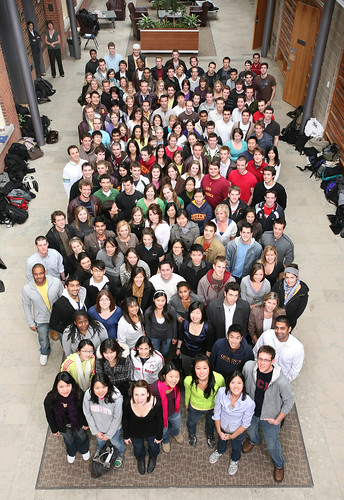Happiness CCCXXVI
Change. Make it your motto.
Change. Make it your motto.
While change can be intimidating, not taking the chance is absolutely frightful.
 It’s an interesting time we live in. Economic turmoil, changing social norms, 100 year old publishing businesses crumbling, and new media powerhouses being established. You’d be hard pressed to give our present era a pass and claim it to be not as important as <fill in your favorite era here>.
It’s an interesting time we live in. Economic turmoil, changing social norms, 100 year old publishing businesses crumbling, and new media powerhouses being established. You’d be hard pressed to give our present era a pass and claim it to be not as important as <fill in your favorite era here>.
Along with these incredible times are some challenges for every business, and everyone that works in them. The reality is that the past decade has brought incredible change in our communications and social structures because of digital communication. Included in this is the first generation raised entirely within the Internet, and mobile communication revolution of advanced technology.
This generation has experienced the freedom of wireless connections from an early age, and rediscovered the power of text communications. The “kids†in this generation have expanded their mental and reflex capacities through vigorous sessions of online, multiplayer, interactive & collaborative games. These folks have no stigma about being online, and this generation comes prewired for online social interaction. They have the ability to actively team-build without preamble and pep talks, can do business virtually without the need to meet in person and can work with folks on the other side of the globe as easily as they work with people in the next cube.
This is the youth movement of today, and they’re entering your business right now. These young folks are part of the largest workforce to enter the American business landscape since the boomers. They are your new entry level employees and they know what’s up. They’re smart, fast to learn new things, and anxious to prove themselves. With the Baby Boomers retiring and GenX/Y moving up, these folks coming out of college are bringing a revolution in relationship management with them.
Are you ready for them?
Photo credit: eddiehosa
![]() Several years ago (okay, more than a decade) there was a great keynote speech by James Burke at ACM 97 where he talked about ‘The Next 50 Years of Computing’. Now, if you’ve seen James Burke’s Connections series, you know what he’s good at. Describing the intertwining relationships of time, technology, and happenstance.
Several years ago (okay, more than a decade) there was a great keynote speech by James Burke at ACM 97 where he talked about ‘The Next 50 Years of Computing’. Now, if you’ve seen James Burke’s Connections series, you know what he’s good at. Describing the intertwining relationships of time, technology, and happenstance.
Here, a decade or so later, I’ve been thinking how true those words are. At the time, Windows 95 was still new, Microsoft Outlook was in it’s initial ‘1.0’ release, and the browser wars of Netscape vs. Internet Explorer were on, and Google was still a dream to be developed. Back then, I was waist deep in technology as a Novell NetWare and then Windows NT “expertâ€, and loving it. It was all about connecting computers together, and getting businesses connected to the Internet. Email and ICQ were HOT.
Fast forward a decade, and so much has changed. Where cell phones were a luxury that businesses could barely afford to sponsor, they’re now the de facto communication device of nearly all of us (who needs a land line). Why have browser wars when you can have 5 to choose from that all have a spot on your Start Menu? Where we used to pay upwards of $30/month for 56k dialup access, today most folks pay about that much for about 100 times that speed. Heck, we have faster connections on our cell phones than we did at home back then. GPS was a nifty gadget where you could plot waypoints to your favorite fishing hole; today, we have full-on navigation packages built into our vehicles to guide us anywhere. The list is endless.
The point I’m getting at is the change all these things have made to our culture. We’ve brought the concepts of democratization to technologies and industries that we used to think impenetrable. Through citizen journalism and social media, we’ve toppled once powerful institutions. We’ve squeezed huge entertainment companies to the point that they lash out at their own customers because they can’t find a new business model. The people of the United States felt they had a real voice that was listened to in the selection of their latest President.
All this is through the incredible advancements in technology that changes our culture.
A decade ago in that keynote by James Burke, he talked about how developed countries were 50 years ahead of underdeveloped countries, and how this pattern would repeat into the future. I believe we’ve sped up the process and are much farther down that path than we believe. We are living in a future that our parents could never have dreamt of. We have the opportunities available to us at the touch of an iPhone that a decade ago weren’t thought possible.
My question then, is what will you do with the advantage of living in the future?
Photo credit: Hometown Invasion Tour
As a note, if you follow the link to the ACM97 slide deck and videos, I just want to point out that it was compiled a long time ago and is not as polished as we see today on YouTube. Just remember that as you go through it. It’s still a great presentation, by a master at telling stories of history and technology. Oh, and I did try to find it elsewhere without luck.
As the fog begins to lift, will we see clearly again?